Publications
February 5, 2024
New from ADAI: Threaten, Distract, and Discredit: Cannabis Industry Rhetoric to Defeat Regulation of High THC Cannabis Products in WA

Citation: Carlini BH, Kellum LB, Garrett SB, Nims LN. Threaten, distract, and discredit: Cannabis industry rhetoric to defeat regulation of high THC cannabis products in Washington State, USA. Journal of Studies on Alcohol and Drugs 2024 (in press). doi: 10.15288/jsad.23-00277 Cannabis industry actors have adopted several arguments used by alcohol, pharmaceutical, food, and tobacco industry…
January 17, 2024
New from ADAI: Food Hardship as a Strong Predictor of Tobacco and Cannabis Use by WA Youth

Citation: Harwick RM, Carlini BH, Williams JR. Food hardship as a strong predictor of tobacco and cannabis use among youth in WA state. Children and Youth Services Review 2024;157:107427. (free link, available through March 4) This brief report from ADAI researchers Robin Harwick, PhD, MS, Beatriz Carlini, PhD, MPH, and Jason Williams, PhD, examines data…
December 7, 2023
New Paper from CERP: Identifying Policy Options to Regulate High Potency Cannabis
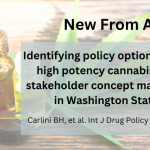
Citation: Carlini BH, et al. Identifying policy options to regulate high potency cannabis: Multiple stakeholder concept mapping study in Washington State, USA. International Journal of Drug Policy 2024;123:104270. Dr. Beatriz Carlini, Sharon Garrett, and Lexi Nim, of ADAI’s Cannabis Education & Research Program (CERP), have a new paper out that aims to describe and contextualize…
November 27, 2023
NEW ADAI Brief: The Use and Impact of Community Drug Checking Services
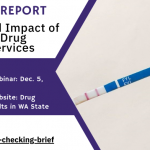
How to cite the new ADAI Brief: Kingston S, Biamont B, Banta-Green C, WA State Community Drug Checking Network. The Use and Impact of Community Drug Checking Services. Seattle, WA: Addictions, Drug & Alcohol Institute, Department of Psychiatry & Behavioral Sciences, School of Medicine, University of Washington, November 2023. Drug checking services (DCS) provide ways…
August 18, 2023
New ADAI Report: The Status of MOUD Provision in Washington State Jails, 2021
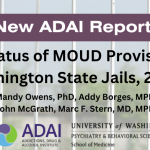
ADAI has a new report out, authored by Mandy Owens, PhD (UW ADAI), Addy Borges, MPH (UW Dept of Child, Family, and Population Health Nursing), John McGrath (WA Assoc. of Sheriffs and Police Chiefs), and Marc F. Stern, MD, MPH (UW Dept of Health Systems and Population Health). Individuals releasing from incarceration are at an…
June 14, 2023
New Report & Webinar: Unmet Needs, Complex Motivations, and Ideal Care for People Using Fentanyl in WA State
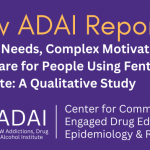
In Fall 2022, the CEDEER Team conducted interviews with 30 WA State syringe services participants who use fentanyl. The purpose of these interviews was to better understand people’s motivations for using fentanyl and what ideal care would look like for them. What did we learn? Want to learn more?
April 18, 2023
Detailed Fentanyl Drug Testing Results for King County (WA Medical Examiner Samples)
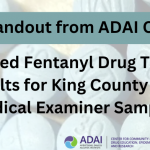
“Detailed fentanyl drug testing results for King County, WA Medical Examiner samples” is a new handout on the StopOverdose.org website with photos of drugs and detailed chemical analyses. Results show a broad range of fentanyl content and highly variable appearances. In February 2023, the King County Medical Examiner sent 12 fentanyl samples to the Drug…
February 22, 2023
New ADAI Report & Virtual Tour: Overview and Perspectives of Syringe Services Programs in WA State
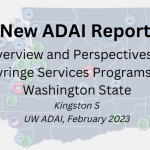
New ADAI Report This new report, Overview and Perspectives of Syringe Services Programs in Washington State, written by Susan Kingston of the ADAI Center for Community-Engaged Drug Education, Epidemiology and Research (CEDEER), describes how Washington State syringe services programs (SSPs) operate, the services they provide, the challenges they face, and their untapped potential. Citation: Kingston…
February 8, 2023
New from ADAI: Community Implementation of Contingency Management to Address Stimulant Use (Hartzler, 2023)
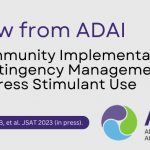
A new publication by ADAI Research Associate Professor Bryan Hartzler, PhD and colleagues reports outcomes of an interagency partnership among the Northwest ATTC, Oregon Health Authority, and Oregon Recovery and Treatment Centers, LLC. This partnership involved an intensive technical assistance project in which opioid treatment programs successfully implemented customized contingency management programming to increase stimulant abstinence…
February 6, 2023
New: How Should Policymakers Regulate the THC Content of Cannabis Products? (Opinion piece in Addiction)

Since the sale of cannabis to adults was first legalized in Colorado and Washington State in 2012, the THC content of cannabis flower has increased and so have sales of high-potency cannabis vapes, extracts, and concentrates. Increased use of higher THC cannabis products can lead to increased cannabis-related harms, including accidents, adverse psychological reactions, psychotic…
Previous page Next page
